#gk books publishers
Text

PM Publishers Pvt. Ltd. (PMP) is a leading publishing house of educational school books. PMP books incorporate the projected NEP 2020, NIPUN BHARAT and NCF 2022 guidelines by MHRD, Gol, the Department of School Education & Literacy, MoE, Gol, and NCERT respectively. For providing cost-effective quality books, the prescribed curriculum framed by NCERT/ SCERT based for the CBSE, ICSE and other state boards forms a basis for us to cater to the needs of all stakeholders.
In a short span of time, the house has created a niche amongst educators. More than 4000 established schools both in India and abroad have already appreciated the significant presence of our books. The books are supported with the latest technology like AR Apps, Multimedia, Assessment Tools, Question Paper Generator, and Quiz Generator. Explore more
Links: https://www.pmpublishers.in/
#Books publishers#computer books publishers#gk books publishers#art & craft books publishers#artificial intelligence books publishers#data science books publishers#english grammar books publishers#environmental studies books publishers.
2 notes
·
View notes
Text
WORLD WAR Z by Max Brooks
It’s been several years, even predating the film, since I read this book. I remember being incredibly engrossed by it. That it is written like a report didn’t bother me, though I know it bothered some. I remember being very impressed by the realistic manner in which the characters were portrayed; like, this is how I imagine people really acting in the face of such an event.
Though most of the…
View On WordPress
#2006#Big Five Publishing#Big Four Publishing#book#book review#book reviews#books#Brad Pitt#Crown#Crown Publishing Group#GK Films#hardback#historic fiction#horror#horror books#horror fiction#horror novels#Marc Forster#Max Brooks#New York Publishers#novels#oral report#Outlet Book Company#paperback#Paramount Pictures#Penguin Random House#Plan B Entertainment#Post-apocalyptic fiction#Random House#Skydance Entertainment
0 notes
Note
Two things came to mind about the whole LG rating thing. The first was that it's something Nostalgia Critic bringsbup a lot, that "PG used to mean something." The second was Coraline and how the kids who the book was read to pre-publishing were scared, but they also really really want to know how it ended, and that's the whole reason it got to publishing.
And while typing out the first part, I was reminded of the GK Chesterton quote about "Faerie tales don't tell children dragons exist. They already know that. They tell children that the dragons can be defeated."
Exactly!
It's good for children to be scared! Both in developing their ability to handle emotions in a safe context, but also because Humans just love it! They love to be scared and freaked out and disgusted! Why do you think horror movies and roller coasters and true crime podcasts and literally any media that covers a taboo topic exist?
10 notes
·
View notes
Text
In 2007 I published what was probably my most-read book What’s Left. It asked novel questions.
"Why is it that apologies for a militant Islam which stands for everything the liberal-left is against come from the liberal-left? Why will students hear a leftish postmodern theorist defend the exploitation of women in traditional cultures but not a crusty conservative don…Why, even in the case of Palestine, can’t those who say they support the Palestinian cause tell you what type of Palestine they would like to see?
“After the 9/11 attacks on New York and Washington, why were you as likely to read that a sinister conspiracy of Jews controlled American or British foreign policy in a superior literary journal as in a neo-Nazi hate sheet? And why after the 7/7 attacks on London did leftish rather than right-wing newspapers run pieces excusing suicide bombers who were inspired by a psychopathic theology from the ultra-right?”
In short, I asked why was the world upside down? In the past conservatives made excuses for fascism because they mistakenly saw it as a continuation of their democratic right-wing ideas. In the early 2000s, overwhelmingly and everywhere, liberals and leftists were more likely than conservatives to excuse fascistic governments and movements, with the exception of their native far-right parties. As long as local racists were white, they had no difficulty in opposing them in a manner that would have been recognizable to the traditional left. But give them a foreign far-right movement that was anti-Western and they treated it as at best a distraction and at worst an ally.
I say my questions were novel because, although socialism was one of the great political movements of the 20th century, few discussed the consequences of its collapse in the 1980s. The decline of the socialist religion had as profound and as perverse consequences as the collapse of Christianity in the late 19th century. But no one, or next to no one, wanted to think about them.
As a good atheist I hated to paraphrase GK Chesterton, but there’s no escaping the old Catholic apologist. My argument boiled down to saying that what Chesterton said about God applies just as well to socialism. When men stop believing in it, “they don't believe in nothing; they believe in anything.”
After dreams of socialism and communism vanished in the 1980s, large sections of the radical left preferred any enemy of the West to the West having no enemies at all: radical Islam, insane Sunni and Shia dictators, Putin’s Russia, violent misogynists and homophobes. As long as they were anti-western, and in particular the enemies of the US and Israel, the radical left was happy to form alliances.
Or as Judith Butler explained the new orthodoxy in 2006, “Understanding Hamas, Hezbollah as social movements that are progressive, that are on the Left, that are part of a global Left, is extremely important.”That by any normal standard Hamas and Hezbollah were tyrannical, inquisitorial, and misogynist was irrelevant. They were anti-western and that alone made them “progressive”.
Not everything I wrote in 2007 stands up well today. In the 2010s we began to see Conservatives fawning over trash like Viktor Orban, and from 2016 on we have seen the wholesale abasement of the US right before Donald Trump. The lure of authoritarianism was by no means confined to the left
But overall, what I said remains true. And just to be clear, I did not then and do not now believe in the horseshoe theory. The far left is not the same as the far right. There is a huge difference between living in a country ruled by Donald Trump and a country ruled by Nicolas Maduro or between Iran and North Korea. The far left and far right target different people, and serve different interests.
It is better to think of radical Islam seducing elements of an exhausted radical left. The white western working class would no longer die for the revolution (truth be told, it was never that keen on dying for the revolution even at the best of times for the left). But young Muslim men would fight and kill Americans and Israelis. And if you could forget about the obscurantist religious tyranny, the hatred of every human right, the persecution and murder of Arab and Iranian leftists, they might in a certain light appear to be a replacement for the western working class that had let the far left down so badly.
When What’s Left came out respectable critics said words to the effect of “come on, Nick, you are just talking about tiny groups of post-Stalinists and post-Trotskyists. The real left was in the then Labour government, trade unions and charities and campaign groups.”
I replied with words to the effect of politics is downstream of culture. Look at academia, the comment pages of the Guardian, the organisers of demonstrations, the left trade unions and many of those supposedly respectable campaign groups and charities. They are getting drunk on a weird mixture of far-leftism, far-rightism and postmodernism. They will embrace medieval levels of superstition and regimes they would have no hesitation in describing as fascist if they were white.
I asked where this was leading. The far left provided an answer when, to the astonishment of my respectable critics, it took over the Labour party under Jeremy Corbyn.
Now the Gaza war has led to another pact being formed between the western far left and radical Islam. Over at Quillette, an American academic, Susie Linfield, has gone through the whole hideous detail of how leftist thought leaders and academics celebrated the murderers. Some of those she indicted are so predictable you would miss them if they were not there.
Linfield notes that in the New Left Review, Britain’s leading Marxist journal, Tariq Ali praised the terrorists for “rising up against the colonizers” and implied, bizarrely, that the murders resulted from Palestinian frustration with Israel’s recent enormous pro-democracy demonstrations against the Netanyahu government.
Elsewhere depression replaces tedium. Anyone who remembers the scrupulous work of Michael Waltzer on what constituted just war will be appalled about what has happened to Dissent, the journal he edited. Dissent used to believe that the deliberate targeting of civilians was a war crime. Not so now when the civilians are Jews. In its pages, one writer described Israel as a ‘genocide machine’ and argued that Israeli victims should not be grieved.
“It is not possible to publicly grieve an Israeli Jewish life lost to violence without tithing ideologically to the IDF—whether you like it or not.” So grief is impermissible. Indeed, it’s worse than that: grief is colonialist.
Elsewhere tenured academics were unable to contain their enthusiasm: the attacks were “innovative,” “astonishing,” a “major achievement,” “awesome,” “incredible,” and “a stunning victory,’’ one wrote.
Ah professors. They write in ink and dream of blood.
The essential point to bear in mind is that these expressions of joy at the death of Jews on 7 October was almost instantaneous. It came before a single Israeli bomb fell on Gaza. It was not a condemnation of Israel’s disproportionately violent response. That was still to come. Instead of rational protest there was a celebration of the mass murder of Jews by Hamas, a terrorist group inspired not only by Islamism but by European fascism. As if to confirm my argument in What’s Left the far left was cheering the far right because it has no one else to cheer.
The same question I asked in the early 2000s can be asked now: where is this heading?
I do not go along with the view among conservatives that all who march with Islamists and their leftist allies are antisemites by definition. From the start of this war, I have said that Israel’s aim of destroying Hamas is impossible. I was going to say that it is impossible without unacceptable civilian casualties. But in truth it is impossible in all circumstances. The Israeli forces simply cannot find Hamas fighters as they melt into a population of two million disorientated people. This is not simply my view. Military specialists are noting the low level of Israeli casualties and the small number of Hamas kills the Israeli Defence Forces are claiming to have made. The odds are that Hamas is refusing to opt for a direct confrontation, and allowing civilians to pay the price. It is always reasonable to protest against futile wars and needless suffering, and this war is no exception to the rule.
And yet before I turn too accommodating, let me say there is no other area of progressive life where liberals and leftists ally with racists and don’t show even the smallest embarrassment about their behaviour.
Here’s a thought experiment. There is a growing concern on the western far right about low birth rates. Rather than allow immigration, Viktor Orban in Hungary is offering tax exemptions to women who have four or more children. The left naturally wants higher welfare payments for mothers, too, and in the case of the UK wants to end a nasty Conservative policy which penalises families on benefits if they have more than two children.
For all that, no progressive would join a demonstration of neo-Nazis or alt-right supporters in favour of encouraging British mothers to have more children. They would think that there was a serious flaw in a campaign that attracted ultra-right white support. They would worry about inciting prejudice against ethnic minorities in the UK. And yet they see nothing wrong in going along with campaigns that attract ultra-right Islamist support or in worrying too much about the UK's Jewish minority.
If the grim absurdities of the left of the early 2000s presaged Corbynism and the collapse of the Labour party, what do the 2020s have in store? I am trying to be objective and so won’t go off into long laments about the moral health of the sacred “Left”. I long-ago gave up worrying about that in any case.
First and most obviously the failure of the white left for more than a generation to oppose Israel while also opposing antisemitism has mainstreamed racial prejudices. The explosion in anti-Jewish attacks since 7 October is an inevitable consequence. I have never seen Jewish people feel so isolated. It’s not simply the far left and Muslim agitators who scare them. BBC presenters and others in the mainstream, who make their indifference to the massacre of Jews plain, foretell a future where Israel is a pariah state and Jews are damned by association and must pay the price. Perhaps that future is already here, and we will be permanently in a Corbynista world where Jews are seen as sinister agents in a Zionist conspiracy manipulating western policy.
Second, the uncritical treatment of Hamas naturally reinforces the most bigoted and reactionary elements in British Muslim communities. The consequences we can only guess at, but I think we can say by looking back at the last time the British left ran off with radical Islamists, they will lead us down new spirals of extremism.
29 notes
·
View notes
Text
Bonsoir! Second part of this pretty spooktober story!
Holmes and Watson are re-interviewing GK and they are NOT. AMUSED. Let's listen to the rich ass

Tell him Holmes! Teach this guy how a gentleman behaves when he has no blackmailer to catch!
Look at this! Holmes is a moment from STRANGLING this man.

SHE IS NOT AN OBJECT YOU BIG BASTARD! Holmes is taking the case only for HER sake, not sure for yours! And you ARE asking for criticism. I'm bonking him HARD over the head! With my chemistry universitary book (1.8 kilos)! (Also Watson is torn between tearing GK to shreds with his eyes and admiring his husband's FORMIDABLE self. Man's sooo much in love)

HE SAID IT! Assault or attempted assault CAN BE WORSE THAN MURDER. AND I HEREBY QUOTE THE LAST SENTENCE TOO.
Rich people, this was written at the beginning of 1900s and IT'S STILL VALID. Holmes is being so valid in this story.
Well, story gets explained, Holmes snarls a bit more and then off to the country to talk to the policeman. Watson favors us with some pretty description too, but i do believe i'm doing what holmes would do in omitting them.

Holmes OF COURSE REMITS ALL THE MERIT! Don't even worry, he's not like Scotland Yard. (Lestrade, yes, it's Holmes, let's postpone this week's thursday sleepover and dinner, ah yes, sorry i've a case, maybe on saturday?)
Watson will publish a full account in a couple of years anyway, lol. People still trusting Watson to shut the hell up about the cases.
And incredible but true, even the local police is ANXIOUS to hold GK accountable for his actions! Godo. Come. Un. Riccio.
Let's see what we have here...

detectives detectiving for a while. And apparently we lost a pistol. GK is being very american in having so many firearms, no offence to my dear American mutuals but this is a part of what America looks like from Italy.
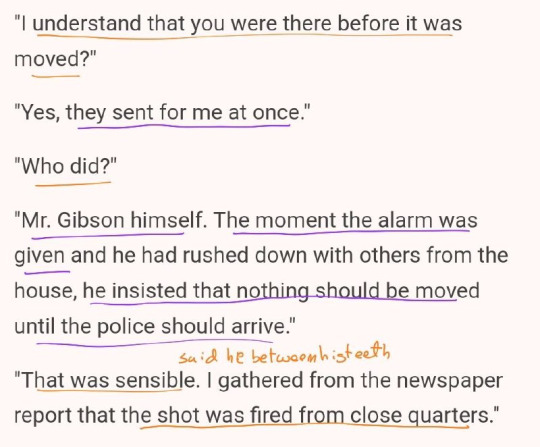
And we have to praise Holmes' intellectual honesty. It was sensible. Even if he's saying it through gritted teeth as every single letter was more painful to him than having his nails tore out. Chapeau!

Hey, nice and anxious cop, calm down. There's an overabundance of 'sir' there! Holmes is seeing some light in it? Apparently?
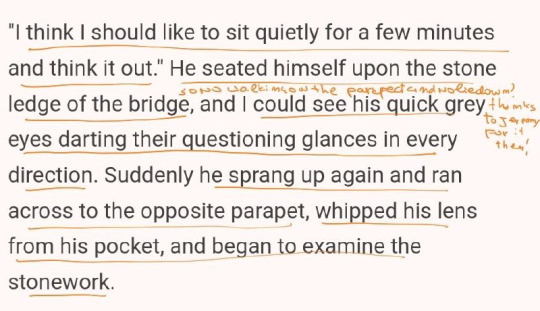
Let him sit and think...
Meanwhile infinite thanks to Jeremy Brett that gave us Holmes walking on the parapet and having a lil lie down on the bridge. I loved that sce- WHAT'S THAT??!
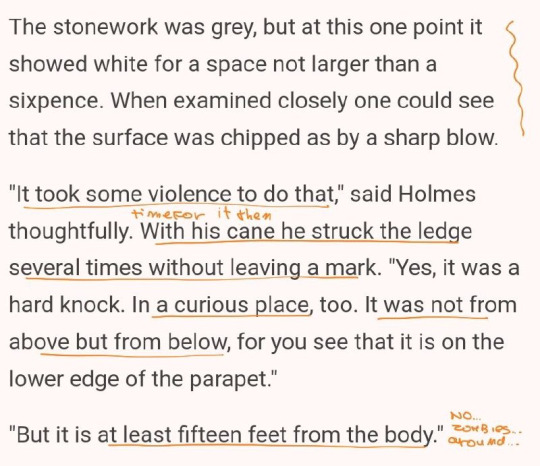
Chipped! And even violence time served just to understand that it took A LOT of violence to chip the stonework. Interesting.
Now, let's hop at GK's, we have a nice examination of the arm-room and then our boys try to go to talk to the young lady. Let's have some considerations

Watson is having a Himbo moment... And Holmes is of course willing to explain. Of course, the place where the weapon was found is the key detail! In freeing her. Let me explain, dearest Watson

Holmes: -sigh- My husband will be never a good criminal. He's too honest. Watson, my darling, DO try and think like a character of your stories THIS ONE TIME.
BUT THE POINT STILL IS

-rubs hands-
We have a NEW TRAIL! A new line of inquiry. Ah, the day's so beautiful, don't you all think?
Which line? Oh well, that comes with the end of the story!
#letters from watson#sherlock holmes#dr john watson#victorian husbands#Himbo Watson#well - only a himbo moment#Guy's a Hunk uwu#i'm very much liking this story
20 notes
·
View notes
Note
getting a few things off my chest about Gen Kill. sorry im in your inbox. but i am. you can publish this ask or keep it in the DM, both are fine.
First, actually the hardest series to watch in all three shows for me. I'm ok with the level of violence in the other two (as well as other trigger-warning content) but the level of civilian casualty in GK just really fuck with me. I find it very hard to want to rewatch GK, even tho I do like the show a lot.
Second, Both TP and GK, for me, are the anti-thesis and deconstruction of BoB. In two different ways. TP talks about another theater and how fucked up these stories are and basically pushes the audience away. Don't look, it's not a story to share (vs BoB that invite you to take part and be with the characters). GK is the modern day glory-seeking meaningless chaotic and toxic reality of the US military (vs BoB's fighting for the right thing, our officers are smart and capable). And they're both meta answers to BoB's more propagandistic story.
Third, ok, let's get silly lol. I have to say whatever is going with Brad and Nate is fucking homo. "Not to be homo sir, but I can kiss you right now" um what. And the eyes contact. Bro. Bruh. That being said... I ship BradRay xD Their bantering old-married-couple dynamic is more my speed, than BradNate victorian yearning dynamic xD
hello, no worries, it's all good, my inbox is always open for thoughts, insights and opinions! this got pretty long so i'm gonna put it under a read more so it doesn't annoy anyone
i published this bc i ended up adding a lot of my own thoughts about it and didn't want it to seem like i was directing them specifically at you or your opinion bc i do go off track a lot.
it was the hardest series for me to get into as well at first, for a similar few reasons. first of all, it felt like i was being dropped into a locked room with men who would hate my guts, and not just have bullied me in high school, but detest my existence too. so i think that atmosphere of over the top toxic masculinity instantly made me uneasy, but that's the point. that's the whole reason the articles, book and show exists really. to show how that mindset and atmosphere laid the groundwork for what happened. i think if they were to have made a show where we as viewers are allowed to laugh along with their jokes, enjoy their interactions, but not be forced to confront the realities of both the invasion and the people taking part, then it would defeat the message and themes that the show is trying to present to us. i think the civilian death, and basically the way the military treated civilians in general, has to make you uncomfortable, otherwise it's not doing its job as a text or piece of media. at least from the writer's perspective and what they wanted to say about what happened there, bc ultimately, everything is a construct with biases and a goal. so i 100% agree with you in that it's easily the most uncomfortable show to casually watch in that regard, but if it didn't show all of that, it wouldn't be a show with a purpose, imo.
i would personally put the pacific a bit closer to band of brothers than gen kill when it comes to discussing its propagandism actually. bc whilst it has the caveat of "this is the reality and brutality of war, it's horrific, you don't want any part of it" and "it's not all camaraderie and brothers being bonded for life", the show still has its 'heroes' who are depicted as sacrificing either their lives or their mental wellbeing for 'the cause', and it still carries the message of "yes this is terrible but it's needed". two things that propagandist themes can thrive amongst. just reading some of the more bootlickery youtube comments about the pacific shows how some of those people cling onto the brutality and harshness of that theatre of war, and the show itself, as a display of heroic bravery and badge of honour. i've seen a few commenters on reaction videos and stuff and they're basically frothing at the mouth about how it's so much more brutal than band of brothers, and they aren't saying it from a critical perspective either, which is what the show may have intended, but more from a "omg brutal war porn nice!!" kinda way. i know i'm rambling off point from what you said, but it's just some of my thoughts. i'm probably gonna ramble a bit in the rest of the post so don't see it as me disagreeing with your points bc i think we have pretty much the same opinion in most ways, but i guess your ask has prompted a lot of thinking from me so i'm just getting some of my thoughts out about the shows.
i think for me, i would say the pacific is a stepping stone between band of brothers and generation kill. i do agree in that it is pushing the viewer away from the idea of war as noble, in favour of saying "no! it's dirty and cruel and harsh and you won't survive it, even if you're alive when it's over" but it's also presented in the same way as band of brothers in regards to how we're supposed to view these men. there's many competent and intelligent guys making decisions and the humanity of those men is always on display. they're still shown as heroes, even if they're broken ones. so i think i can't fully align it with gen kill as a direct opposition to the messaging in band of brothers, but more one that says "ok, we've seen it from that perspective, now let's open up the casket up a little more and try to understand it looking through another lens".
whereas for me, gen kill sets explosives in the casket and blows that shit to pieces. there are no noble heroes competently achieving great feats, or sacrificing their lives for 'the greater good'. the people who do die, or get wounded, are seen as wasted casualties and missions gone wrong, fuck ups that we see in the corner of exterior shots to remind us that it's not all singing avril lavigne in a humvee, that there are consequences, even for the invaders. we see the destruction they inflict on civilians constantly, but the marines that get wounded/die are essentially proof of the incompetencies and fuck ups that even the most militaristic audience has to admit to.
the line of morality is non-existent, apart from a few people that we meet, but they have no power whatsoever. they can't actually do anything even if they disagree with what's happening. they stand by and they watch. we get nate who hates it, very clearly, but his whole thing is that he literally can't do anything. he has no actual power or impact on anything there. i saw a meme on here a few days ago where it was like "i'm competent at my job but i'm starting to think i'm just decorative" and it's funny and just a silly meme but it's also kind of the truth. we see him make a few decisions that go over the head of the initial orders, etc, but in the big picture, they have so little effect that it's a drop in the ocean comparatively. so the little competency we do have is ineffective. and even the more authoritative roles within the narrative that we get to see, like ferrando, are shown as not just making bad decisions, but actually not having much control over matters themselves. they're all floundering from top to bottom. there's no basilone or winters or ack ack there to make us sigh with relief as viewers bc finally, someone will make things right, make the right choice, do the right thing. instead we have these very complex people who have a lot of messed up flaws and shit within them, but some realistic relatabilities too. and sure, a good few of them want to do better and will call out certain shit they see in different ways (doc bryan, nate, espera, brad) but ultimately, they're forced to not just watch and let it happen, but a lot of the time, take part and be culpable for those actions too.. and it's not depicted as a noble sacrifice of their morality, it positions them as helpless and incapable. so the viewer doesn't get their usual hbo war heroes, which to me, feels like a direct answer to both band of brothers and the pacific in that kind of way.
i feel like walt's character shows us that (on a surface level basis but still). he's presented to us as the more appealing contrast to trombley. they're both young and in brad's team, two sides of a coin you could say bc we're shown immediately that trombley is the problem child and walt is the pretty golden boy that spends his scenes telling brad to get some rest or trying to fix the dodgy equipment they've got, or essentially is just trying to be helpful. but they both fuck up bad and kill civilians as an individual. we don't get to keep our clean innocent pretty boy. he fucks up. bad. his hands aren't clean. none of theirs are. not nate's, not even doc bryan's. he says that himself. walt clearly feels terrible afterward and that's the difference between him and trombley (though i will say i do think trombley is much more complex than we see on the surface), but walt doesn't get to escape the blood on his hands. even the most seemingly "innocent" characters never get to remain that in this show. there are no heroes.
and then the second point i mentioned above about the message of "yes was is terrible but needed sometimes" is the other thing that gen kill throws away and abandons. nothing, not a single thing, is depicted as needing to happen. yeah, they're told it's needed and honestly, a lot of those marines were brainwashed into believing it, but the whole point is that it wasn't. it was a colossal fuck up in every way and the show holds up a massive flashing neon sign showing us exactly how, but from the ground.
so absolutely fully agree with you that this show is positioned as a meta deconstruction to band of brothers themes, and even the pacific, especially when the shows are presented as a package deal, as hbo war so often is. it's all a lot more nuanced than what i've said bc i've just been rambling AGAIN, but i think there's a lot of dialogue going on between the three shows when you analyse them from further away that is really interesting to discuss.
so yup, definitely agree with what you said and thank you for dropping by my inbox to talk about this kinda stuff with me! i'm sorry if i went into too much detail or overtook this ask with my own opinions or anything but yeah. i think we all know by now that i tend to ramble when asked about anything!
NOW ONTO THE FUN PART!
it genuinely feels like bradnate have taken up residence in a very large part of my brain. i had heard a lot of people mentioning bradray on here before i watched, so i was expecting that to be the main 'ship' of the show, and kinda thought i'd probably end up getting onboard with that, but i actually only got platonic besties vibes from them. i'm always down for as much gay as possible, so i support it, but i just don't really see anything outside of platonic love between them? i do really enjoy their relationship and interactions though, and some of their scenes are my absolute favourites.
but i'm ALL about the victorian repression and yearning, so ofc bradnate is where it's at for me. as a gay man who repressed all his emotions growing up it just calls to me like a siren lmao. i think that's why i'm like a feral little gremlin about nate actually
#one day i will stop answering asks with 2k word essays but that day is very clearly not today!#once again i apologise to the people of my dash#at least i put a read more on this one#julian's inbox
12 notes
·
View notes
Text
Thanks for ask, hon
Hello! How are you doing? Haven’t been there for a year or so. Re-read all your GK writings… how I missed them! TT_____TT Are you still writing?
Hello! First, thank you so much to like my writings. Secondly, I’m really fine, thank u, indeed, this morning I recieved a phone call and I get a job (after four years without job) and in 2025 I’m going to publish my first book. Yay!
And about the writing... Actually, I’m not writing because I burnt out writing those imagines and fics like 2 years ago (even I don’t rembember the time I abandoned this blog). And, also, I had mental health problems (but now I’m fine), so I hadn’t the streng to continue writing.
So, today, I’m not writing, maybe in the future I could come back to write, but probably I would write my own fics with the same fandom (you know: gk, snk, lupin, vinland).
8 notes
·
View notes
Text
An Early History of Detective Fiction (Part 3)

Agatha Christie ‘The Murder of Roger Ackroyd’
While it is true to say that Agatha Christie never approached her work from a feminist viewpoint, or indeed never seemed to ‘buy in’ to the feminist doctrine, her mark on the canon of detective fiction cannot be understated.
Again, the historical context of the release of The Murder of Roger Ackroyd, and its subsequent reception can be considered as important to an understanding of the text, and the conventions of detective fiction in this era. The novel also constituted a remarkable break in form and convention, which I’ll look at in due course.
Between Collins and Christie, there is a tremendous leap forward both in time and the conventions of the genre. This was what Julian Symons calls ‘The First Golden Age[i]’, which was dominated, as in the late Victorian era, by the short story, and by male authors such as GK Chesterton and R Austin Freeman.
From this point we can chart the rise of the novel as opposed to dependence on the short story, which can be attributed, as with the Victorian sensation novels, with a rise in availability of literary works to the masses, and with the time available to read them. Says Symons
‘The emancipation of women, which took place during the [First World] War played a large part in the creation of a new structure in domestic life, particularly in Europe, through which women had more leisure, and many of them used it to read books’.[ii]
Christie’s first novel The Mysterious Affair at Styles (1920) was published at just the right time to capitalise on the availability of this demographic. It was also the first novel to feature her Belgian detective Hercule Poirot. In his fastidiousness, he was neither a Dupin nor a Cuff. But Martin Priestman, in Crime Fiction: From Poe to the Present (2013), notes that ‘while traditional British attitudes could be relied on to regard a French accent as inherently absurd, the role of the gallant little Belgium in the recent Great War added a more positive element.’ [iii]
It can be considered that Christie’s career continued without much distinction until the appearance of The Murder of Roger Ackroyd in 1926. She was one of a group of detective story writers publishing books at this time, all based around the same conventions, notably Dorothy L Sayers with her Lord Peter Wimsey stories, and Anthony Berkeley with his Roger Sheringham tales.
The mystery writer and Catholic priest Ronald Knox even went so far as to devise a list of ‘ten detective story’ commandments in the early part of the twentieth century, which writers of detective fiction should follow as an informal framework to protect the ‘purity’ of the genre. Among these were the commands ‘no accident should ever help the detective’ and ‘The stupid friend of the detective, the Watson, must not conceal any thoughts which pass through his mind.’ With The Murder of Roger Ackroyd, Agatha Christie tore straight through the fabric of this convention, and set a new standard for innovation in the genre.
The beauty of the moment of revelation in The Murder of Roger Ackroyd is that it is entirely unexpected and really set a template for writers to be unconstrained in terms of structure, and of form. Readers up to this point felt familiar with the detective novel format – the country setting, the consulting detective, the locked room mystery, the conservativeness of the characters. The reader above all trusts the man of position, the doctor who is narrating our tale, and has earned his position of trust via his positioning as an agent of good in his profession. As Martin Priestman says
‘The ‘least-likely’ game took a step forward which, for some critics, threatened the whole basis of the genre by breaking one of its cardinal rules: that the narration itself should be free of suspicion.’[iv]
Christie is very careful – at no point does Dr Sheppard lie to the reader. The reader, with perhaps an overfamiliarity with detective story conventions, such as those laid out by Knox, are taken in completely.
In her introduction to the set text edition of The Murder of Roger Ackroyd, the writer Laura Thompson states that Christie detractors, those seeking to diminish the powers of her innovation are missing the point entirely. It is her very simplicity that makes these moments so devastatingly impactful.
‘For they fail to grasp the essential point about Christie’s simplicity, which is that it is entirely intentional, and indeed as deceptive as the narrator of The Murder of Roger Ackroyd.
Dr Sheppard never outrightly lies in his narrative, but he leaves us certain trails of breadcrumbs as clues, which are the parts we instantly reread once we’ve learned the secret to see how the facts of the case passed us by completely, particularly this passage
‘The letter had been brought in at twenty minutes to nine when I left him [Ackroyd], the letter still unread.’[v]
The evidence is in plain sight, now we know the secret, but this was a work of such originality at the time that it would never have occurred to us to pursue the thread.
Conclusion
Although I stated at the beginning of this essay that I was going to have to be careful not to recite a full history of the development of the detective novel in the English language, it has been necessary to provide a decent amount of historical context to highlight the achievements of each writer I have explored. With Edgar Allen Poe, I had to look at the ways he had innovated, by comparing his achievements with what had gone before – including the examples of Oedipus the King and John Godwin’s Caleb Williams. The detective force was in its infancy when Poe was writing, and he deserves credit for working largely blind of what the force would be capable of and what the police would bring to the table in terms of skills and direction, which seemingly wasn’t much, judging by the way police investigation in The Murders in the Rue Morgue is floundering until Dupin involves himself in it
The bumbling official force is something that was a common thread from Poe, through the local inspector in The Moonstone, and the local police in The Murder of Roger Ackroyd.
An area where the texts differ is in their engagement with social issues of the day. Collins is by far the most socially engaged of the three writers I’ve explored. At least directly. He infuses The Moonstone with issues of Empire (represented by the three Brahmin), with an exploration of class difference (the storyline between Franklin Blake and the unrequited Rosanna Spearman) and even feminism in the strong-willed Rachel Verinder.
Indirectly though, it’s possible to read The Murder of Roger Ackroyd as a commentary of a ‘lost generation’ as a legacy of the First World War, as some critics have discussed. Though we can’t read Christie as a feminist, it doesn’t mean that she wasn’t conscious of issues of equality in the wider world.
It has been interesting to see how historical context has shaped three very different authors, and my exploring the texts in date order has allowed me to engage my reader in the narrative development of the genre, and how historical context has shaped and guided convention, form and structure, rather than being divorced from it as in the premise of the initial question. The narrative approach has been useful to me in presenting my ideas on how texts are conceived, and how they are brought to the market. All of the texts I have explored have benefitted from changes in society around the time of publishing – the expansion of lending libraries, and the socioeconomic factors that have enabled the dissemination of works of fiction on a mass scale to previously untapped markets – women readers and the working classes.
By engaging with the social issues and the historical context of each of the works – such as the Industrial Revolution and how that changed society and its reading habits - I’ve been able look in detail at how these details give extra life and meaning to the work, and how these changes feed into elements of form and context, and helped shaped the detective novel throughout history.
[i] Symons, p. 90
[ii] Symons, p. 116
[iii] Martin Priestman, Crime Fiction from Poe to the Present, Northcote House, 2013, p. 21
[iv] Priestman, p.21
[v] Agatha Christie, The Murder of Roger Ackroyd, Harper Collins, 2013, p.44
Bibliography
Ackroyd P, Poe: A Life Cut Short, Vintage, (2009)
Christie P, The Murder of Roger Ackroyd, Harper Collins, (2013)
Collins W, The Moonstone, ed. by Francis O'Gorman, Oxford World’s Classics (2019)
Knight Stephen, Crime Fiction 1800-2000: Detection, Death, Diversity, Palgrave Macmillan, (2004)
Poe E.A, The Selected Writings of Edgar Allan Poe, ed by G.R Thompson, Norton Critical Editions, (2004)
Priestman M, Crime Fiction: From Poe to the Present, Northcote House Publishers, (second edn 2013)
Pykett L, The Sensation Novel: From The Woman in White to the Moonstone, Northcote House Publishers, (1994)
Symons J, Bloody Murder, Pan Books Ltd, (1994)
Towheed S, Reading Wilkie Collins ‘The Moonstone: Readership, Form & Context, p. 11, (2022)
Whalen T, Average Racism: Poe, Slavery, and the Wages of Literary Nationalism, from The Selected Writings of Edgar Allan Poe, ed by G.R Thompson, Norton Critical Editions, (2004) pp. 921 - 941
6 notes
·
View notes
Text
Cracking the Code: 5 Essential Tips to Ace the SSC AE Exam for Civil Engineers
For civil engineers hoping to land a government position, the Staff Selection Commission (SSC) Assistant Engineer (AE) test is a very tough and sought-after exam. The secret to success is a methodical approach to preparation. These are the top five strategies to help you pass the SSC AE test and start a fulfilling career in civil engineering. 1. Get the Basics Right The SSC AE exam puts your knowledge of fundamental civil engineering topics to the test. Consequently, it is essential to have a solid understanding of the foundations. Concentrate on topics such as:
Strength of Materials
Structural Analysis
Concrete Technology
Geotechnical Engineering
Fluid Mechanics
Examine your undergraduate course materials and textbooks to start your preparation. These sources offer a strong basis. In addition, take into account consulting reference books written by well-known writers like R.K. Bansal, S.K. Duggal, and B.C. Punmia, which provide extensive explanations and a ton of practice problems.
2. Create an Organized Study Schedule Effectively mastering the extensive subject of the SSC AE test requires a well-structured study strategy. Break up your preparation into digestible chunks: Daily Study Hours: Set aside a certain amount of time every day to study. Remember that consistency is essential, so follow your timetable exactly. Weekly Objectives: Establish weekly objectives to address particular subjects. This method guarantees that every subject is presented methodically and aids in progress tracking. Revision: Schedule regular time for revision. Reviewing subjects aids in memory retention and helps pinpoint areas that require further focus.
Your preparation will go more smoothly if you make a schedule that balances all of the disciplines, such as technical subjects, general awareness, and general intelligence and
reasoning.
3. Use mock exams and previous year's papers for practice. Understanding the exam format and honing time management techniques require practice with past year question papers and frequent mock exams. Here's why they are so important: Exam Pattern Familiarity: You can become familiar with the format and degree of difficulty of questions asked by reviewing past year's papers. Time management: Mock exams help with stress management and time management by simulating actual exam settings. Performance analysis: Identifying strengths and shortcomings is aided by regular practice. Pay greater attention to the areas where you find it difficult to perform better overall. For practice, a variety of mock exams and previous year papers are available through resources such as SSC AE preparation books and internet platforms.
4. Increase the Accuracy and Speed of Problem-Solving Accuracy and quickness are critical in competitive tests. To improve these abilities: Practice on a regular basis: Work through as many problems from many areas as you can. You get faster and more precise the more you practice. Tricks & Shortcuts: Acquire and utilize techniques and shortcuts to solve numerical issues. In addition to saving time, this lowers the possibility of mistakes. Practice Sessions With Time Limits: Set aside certain time windows to work on specific issue sets. Reduce the time limitations gradually to increase your speed. You can try the most questions successfully in the allotted time by striking a balance between speed and precision.
5. Remain Current on News and General Information The SSC AE exam's general awareness component assesses your broad knowledge and comprehension of current events. To perform well in this area: Daily News Reading: To keep up with local, national, and worldwide news, make it a practice to read newspapers, watch news channels, or utilize news apps. Monthly publications: These are publications published every month that focus on current events. These offer a thorough rundown of significant occurrences and problems. Static GK: Address subjects that are commonly tested in exams, such as geography, history, politics, and economics.
Taking a balanced approach to your preparation for the SSC AE test means covering both general knowledge and technical areas. Last Words It takes commitment, preparation, and steady work to pass the SSC AE test. You may greatly increase your chances of success by learning the principles, adhering to an organized study schedule, practicing a lot, honing your problem-solving techniques, and keeping up with current events. Remain motivated and focused, and never forget that each step you take toward your objective will bring you one step closer to a rewarding career in civil engineering.
Start Your Preparation With: https://gameacademy.in/ / https://clppenny.page.link/cTBm
Recomended: https://www.youtube.com/@gblions / https://www.youtube.com/@gblionsaeje
0 notes
Text
Best CDS Preparation for Written Exam with Avision Institute
Introduction:
The date of the UPSC CDS test is set for April 21, 2024. There aren't many days left, therefore applicants need to be almost done with the CDS syllabus. To better comprehend the exam, applicants must, however, also go over the CDS exam pattern and utilize the preparation materials to the fullest. In order to get their success, participants must also take mock exams and practice CDS questions with the guidance of the best coaching for CDS exam preparation. In this blog, we will be discussing on the Best CDS Preparation for Written Tests with Avision Institute. Let’s discuss this in detail.
The Combined Defense Services (CDS) exam is administered by the Union Public Service Commission (UPSC) twice a year to applicants who wish to enroll in the Indian Air Force, Indian Military Academy, Indian Naval Academy, or Officer's Training Academy. On December 20, 2023, UPSC published the official announcement for the Combined Defense Services Examination (I), 2024. Applicants can review this article for a comprehensive study plan for the exam's General Awareness, Elementary Mathematics, and English portions. To learn more, scroll down!

CDS Exam Preparation Tips:
Aspirants can achieve higher scores on the UPSC CDS exam 2024 by using an effective study plan and joining the top CDS coaching in India. Here are some general study guidelines that candidates should adhere to:
To find out the subjects covered, the number of questions, the total number of marks, and the length of the test, candidates should study the most recent exam pattern.
To comprehend the exam themes, they need to consult the syllabus. It guarantees that the candidates don't squander time on unrelated subjects.
They have to make a schedule and follow it.
To quickly understand the topics, candidates may consult the books that are highly suggested.
To gauge their degree of preparation, they have to solve the previous year's paper and take a daily practice exam.
CDS Exam Time Management:
To finish the paper in the allocated time, candidates must effectively manage their time. The following are some time management suggestions:
Those planning to take the CDS 2024 should start studying three to six months in advance.
They should stick to a regular study schedule to make sure they cover everything in the syllabus.
It is required of candidates to monitor the weekly modifications.
Keeping up with all the latest happenings will help them feel more confident.
CDS Preparation Tips for General Knowledge:
First, create a schedule that specifies how many hours a candidate must spend on the GK portion.
For good preparation, candidates must read the NCERT geography, civics, and history textbooks.
It is recommended that individuals periodically peruse newspapers and journals in order to remain informed about current events occurring both domestically and globally.
During the study, candidates are required to jot down significant points.
CDS Preparation Tips for Mathematics:
Candidates should begin their CDS preparation by enumerating the chapters that are easy and difficult based on weight.
To help students memorize formulas, they should write them down and read them every day.
Every concept should have a theoretical foundation, and students should go through example problems to learn how to approach them.
Applicants must refrain from learning how to solve any certain kind of problem by heart. Practice the sum instead, and learn the methods and theory involved in solving it.
To comprehend the question pattern, they need to learn NCERT Math.
CDS Preparation Tips for English:
Candidates need to study English grammar and consult reference materials such as Wren & Martin.
They must to perform the grammar tasks in addition to just skimming them. The exercise would improve understanding of how regulations are applied and used.
They should learn to read, make a note of words they don't understand, and research the meaning of those words. Discover how to use them as well.
The new vocabulary must be used by candidates in regular writing and conversation. It will facilitate word memorization.
Conclusion:
Furthermore, practice is the most important concept and that leads you to the success at any stage of preparation. Join Avision Institute the best CDS coaching in Kolkata that bring the best written test preparation for the candidate. Join and get the best success and achievement for the competitive exam.
0 notes
Photo

New Post has been published on https://www.billiardgods.com/gk-buy-custom-cue/
(FAQ) Should you buy a custom cue?

(About the Author)
The biggest advantage to getting a custom cue is that it is built to your specifications. Here is a list of custom elements that will make a stick unique:
Balance and weight – the balance can be shifted forward or back as needed. Weights can be embedded into the joint or into the butt of the stick.
Shape – you can have the butt shaped with turnings per your custom design and pattern.
Butt wood and shaft wood – you can select from a huge variety of exotic woods, including ebony, tulipwood, cocobolo, birdseye maple, zebrawood, and dozens of others.
Inlays & rings – these can be made in hundreds of designs in a variety of woods, mother of pearl, turquoise, even silver and gold.
Points – you can have multiple points of multiple patterns with unique sequences of exotic woods.
Length – the length can be customized to your height, and the joint placed for a longer or shorter shaft.
Type and placement of wrap – this can be Irish linen, regular or exotic leather, other material, or no wrap.
Ferrules – the materials used can be ivory or special fibers in various lengths.
Tips – there are many different brands of tips of various hardness levels and types (layered or one piece) made from a wide variety of materials.
Joints – select from any of the several common joints, made from different materials or even a wood-to-wood joint.
With this level of customizable complexity, production cue makers are unable to offer much variety. They can provide a selection of different lines of cues with options, such as different weights, points, and a few design selections. With a custom cue maker, you can get as picky as you want.
To locate a cue maker, talk to several individuals who have custom cues and ask why they selected their maker. Talk about the costs, the flexibility, and turnaround times. If you decide to check out a couple, send them email and ask questions. It doesn’t hurt to ask to see any completed cues they may have. You might find something you like. If you are satisfied with the quality work, the next question is to check out the turnaround time. The really good cue makers are usually booked for a couple of years.
You can look for someone who is local (within 50 miles). Even if cue-making is a hobby or part-time, he will take pride in his work. Much of his business will probably be cue repair and tip replacement. But he will have the equipment for manufacturing a custom job for you. Talk with him.
A local maker will be available to fix any problems that comes up, or handle routine maintenance. He will also be able to take a look at your playing styles and make suggestions on specifications.
Mainly, you want a stick you are proud to take out of your case and have others crowding around drooling over various beautiful elements of your prize. With a great stick, you can believe that your game will improve dramatically.
Whoever becomes your cue maker will have an almost fanatic desire to make sticks that reflect their personal sense of craftsmanship. Workmanship and multiple levels of quality control are hallmarks of his work. They will stand behind their work and are always available to fix anything that goes wrong.
You might decide to become a cue collector. You can collect cues based on styles, inlays, exotic woods, cue maker, or any parameters you find acceptable. Depending on your requirements, this can become expensive. But the love of conversing with other collectors and the process of hunting down a specific cue by a specific maker, combined with the bargaining can be an exciting adventure by itself.
Good luck!!
0 notes
Text

Buy New Destination Publication Books In India
Buy New Destination Publication Rajasthan General Knowledge GK (Samanya Gyan) 11000+ One Liner Questions 4th Edition December 2022-23 BY J.P. Swami Available At Booktown.in. All the books of this Publication are popular among students of RSMSSB - VDO Exam. Gram Sevak, Village Development Officer is published by New Destination Publication Books and authored by J.P. Swami Experts with easy concepts as per the RSMSSB - VDO Exam.
New Destination Publication Books
0 notes
Text
RPSC 2nd Grade Teacher Previous Year Papers 2022
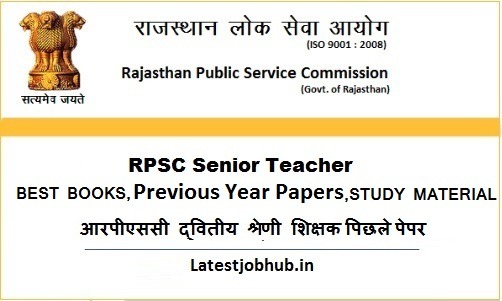
RPSC 2nd Grade Teacher Previous Year Papers 2022, How to prepare for RPSC Senior Teacher Exam, Rajasthan Second Grade Bharti Old Question Papers, Sample/Model Papers, RPSC Grade II Teacher Exam preparation, Tips, Tricks, Strategy & Planning
RPSC 2nd Grade Previous Question Papers 2022- Rajasthan Public Service Commission is conducting the Senior Teacher (Secondary Education) Competitive Exam 2022. Commission has announced the 2nd Grade Exam Date which will conduct from 17 to 24 December 2022 (Secondary Edu.) and in January 2023 (Sanskrit Edu). Authority recently published Senior Teacher (वरिष्ठ अध्यापक) Bharti Notification for 9760 Vacancies for English, Hindi, Mathematics, Punjabi, Science, Social Science, Urdu, and Sanskrit Subjects. This time lakhs number of candidates are preparing for Rajasthan 2nd Grade Bharti Exam.
Now they can practice solving 2nd Grade Question Paper in time duration using RPSC Senior Teacher Previous Papers. There will be two papers (Paper-I & paper-II) in Senior Teacher Competitive Exam. Paper-1 will be held for General Knowledge and Paper-2 will be of the Subject concerned. Therefore candidates collect Study Materials like Best Books, Coaching/GK Notes, Previous Year Question Papers, and Practice Paper sets for better preparation.
Candidates may know Rajasthan 2nd Grade Exam Question Paper Level by solving Old Year Papers. And they can cover all topics from the RPSC Second Grade Syllabus subject-wise. We are providing here the last 10 Years' question papers of the RPSC Second Grade Recruitment Exam.. Therefore all candidates first download RPSC 2nd Grade Teacher Previous Year Papers in Hindi PDF and Solve these papers for improving Exam performance.
For more visit www.latestjobhub.in
#Rajasthan Second Grade Bharti Old Question Papers 2022#RPSC 2nd Grade Teacher Previous Year Papers 2022#RPSC Senior Teacher Exam 2022#RPSC Grade II Teacher Exam Preparation 2022
0 notes
Note
Yep. I think Grey's has become a show with too many people involved behind the scenes and even when the writer's have a vision for how they want an episode to go, I feel as though the network has a lot of say in what actually goes on and the scripts end up going through constant revision. This is why streaming services are becoming increasingly popular with creatives.
It’s so weird that this is how TV is. I might be talking outta my ass but I’m assuming networks have job security but those independently produced or on streaming services allow for more creative freedom but a shorter run time. So it’s kind of like: which do you want?
Even if you get picked up by a network, you could be dropped for no reason at all like New Girl and Brooklyn 99. Those shows were/are good and just dropping it because viewership is down sucks when you have a story to tell.
It’s one of the big reasons I didn’t want to go into teaching (I was very much on my way to becoming a teacher) because there was a curriculum I had to follow but it was always outdated or not what I’d want to put forward in my own personal classroom. So I chose not to play in that system. And I know as a writer, trying to get your story/book published, you will be presented with very similar hoops to jump through.
#but Amazon allows you to self publish and that’s really the only way I think I would publish my work#it is a real dream of mine to one day publish a book even if it’s self-published lmao#gk asks#grey's anatomy#anonymous
0 notes
Text
Cracking the Code: 5 Essential Tips to Ace the SSC AE Exam for Civil Engineers
For civil engineers hoping to land a government position, the Staff Selection Commission (SSC) Assistant Engineer (AE) test is a very tough and sought-after exam. The secret to success is a methodical approach to preparation. These are the top five strategies to help you pass the SSC AE test and start a fulfilling career in civil engineering. 1. Get the Basics Right The SSC AE exam puts your knowledge of fundamental civil engineering topics to the test. Consequently, it is essential to have a solid understanding of the foundations. Concentrate on topics such as:
Strength of Materials
Structural Analysis
Concrete Technology
Geotechnical Engineering
Fluid Mechanics
Examine your undergraduate course materials and textbooks to start your preparation. These sources offer a strong basis. In addition, take into account consulting reference books written by well-known writers like R.K. Bansal, S.K. Duggal, and B.C. Punmia, which provide extensive explanations and a ton of practice problems.
2. Create an Organized Study Schedule Effectively mastering the extensive subject of the SSC AE test requires a well-structured study strategy. Break up your preparation into digestible chunks: Daily Study Hours: Set aside a certain amount of time every day to study. Remember that consistency is essential, so follow your timetable exactly. Weekly Objectives: Establish weekly objectives to address particular subjects. This method guarantees that every subject is presented methodically and aids in progress tracking. Revision: Schedule regular time for revision. Reviewing subjects aids in memory retention and helps pinpoint areas that require further focus.
Your preparation will go more smoothly if you make a schedule that balances all of the disciplines, such as technical subjects, general awareness, and general intelligence and
reasoning.
3. Use mock exams and previous year's papers for practice. Understanding the exam format and honing time management techniques require practice with past year question papers and frequent mock exams. Here's why they are so important: Exam Pattern Familiarity: You can become familiar with the format and degree of difficulty of questions asked by reviewing past year's papers. Time management: Mock exams help with stress management and time management by simulating actual exam settings. Performance analysis: Identifying strengths and shortcomings is aided by regular practice. Pay greater attention to the areas where you find it difficult to perform better overall. For practice, a variety of mock exams and previous year papers are available through resources such as SSC AE preparation books and internet platforms.
4. Increase the Accuracy and Speed of Problem-Solving Accuracy and quickness are critical in competitive tests. To improve these abilities: Practice on a regular basis: Work through as many problems from many areas as you can. You get faster and more precise the more you practice. Tricks & Shortcuts: Acquire and utilize techniques and shortcuts to solve numerical issues. In addition to saving time, this lowers the possibility of mistakes. Practice Sessions With Time Limits: Set aside certain time windows to work on specific issue sets. Reduce the time limitations gradually to increase your speed. You can try the most questions successfully in the allotted time by striking a balance between speed and precision.
5. Remain Current on News and General Information The SSC AE exam's general awareness component assesses your broad knowledge and comprehension of current events. To perform well in this area: Daily News Reading: To keep up with local, national, and worldwide news, make it a practice to read newspapers, watch news channels, or utilize news apps. Monthly publications: These are publications published every month that focus on current events. These offer a thorough rundown of significant occurrences and problems. Static GK: Address subjects that are commonly tested in exams, such as geography, history, politics, and economics.
Taking a balanced approach to your preparation for the SSC AE test means covering both general knowledge and technical areas. Last Words It takes commitment, preparation, and steady work to pass the SSC AE test. You may greatly increase your chances of success by learning the principles, adhering to an organized study schedule, practicing a lot, honing your problem-solving techniques, and keeping up with current events. Remain motivated and focused, and never forget that each step you take toward your objective will bring you one step closer to a rewarding career in civil engineering.
Start Your Preparation With: https://gameacademy.in/ / https://clppenny.page.link/cTBm
Recomended: https://www.youtube.com/@gblions / https://www.youtube.com/@gblionsaeje
0 notes
Note
What about some of the weirder and underappreciated sea monsters?
I’m going to level with you, this took forever because whenever I see the words “underappreciated sea monsters” a part of my brain statics out & starts chanting ALL👏 OF👏 THEM
but since I can’t figure out how to turn a beam of concentrated enthusiasm for every sea monster ever to exist into a tumblr post, here’s an attempt to cover some greatest hits:
Serra/Sawfish
Underappreciated really only applies in modern times, since the sawfish had a wildly successful career as a medieval ocean menace & is one of the few marine creatures to regularly appear in bestiaries
Isidore of Seville describes it as having a serrated back that it uses to cut through the bottom of boats (clearly based on Pliny the Elder’s account of swordfish stabbing passing vessels)
But in its most popular iteration the sawfish is more irritating than lethal. Standard operating procedure is to force any ship it sees into a race, only to get bored and tired partway through and plunge back into the depths out of frustration
This is supposed to teach a moral lesson about persistence, but it mostly seems like a fun random encounter
The real delight is that, because no description other than “serration” and occasionally “wings” is really offered, artists were free to draw whatever they thought a commitment-phobic sea nuisance should look like
Is it a bird? A dog? A fish? Unimportant! It’s here to cause problems

[Bibliothèque nationale de France , Latin 10448, fol. 119v]
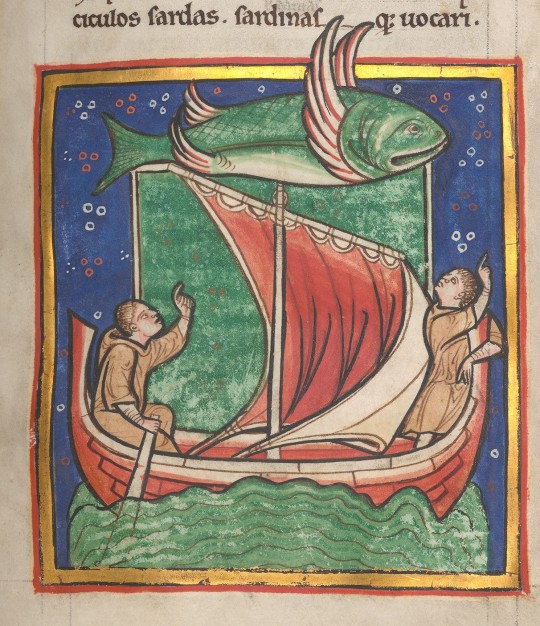
[The Morgan Library & Museum, MS M.81, fol. 69r]
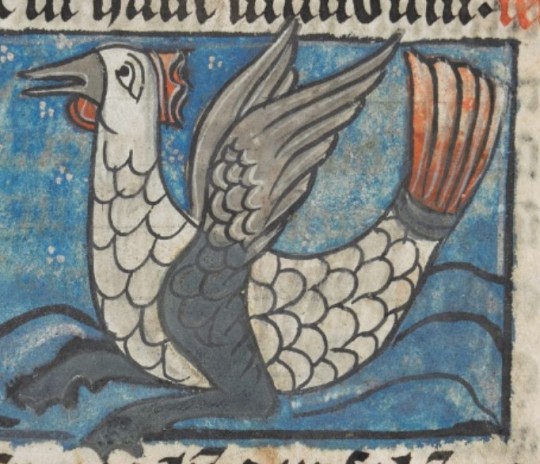
[British Library, Sloane MS 278, fol. 51r]

[British Library, Sloane MS 3544, fol. 42v]
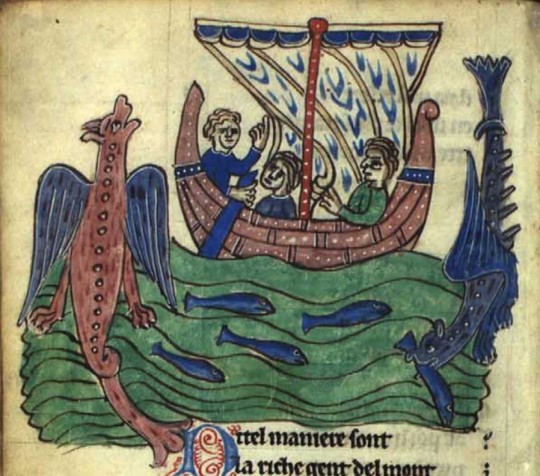
[Det Kongelige Bibliotek, GKS 3466 8º, fol. 44]
Flying Turtle
This implausible little guy’s first recorded appearance is on a 1558 edition of a map of Northern Europe by Dutch mapmaker Cornelis Anthonisz
It was quickly copied by many of the biggest names in 16th c. cartography, including Abraham Ortelius & Gerard Mercator (of Mercator projection fame/infamy)
In Sea Monsters on Medieval and Renaissance Maps Chet Van Duzer suggests that, since Anthonisz’ publisher printed under the sign of the turtle, it’s possible this was a piece of branded content that got mistaken for a real creature
That’s both great marketing and a great origin for a cryptid. Modern publishing houses take note
“According to all known laws of aviation, there is no way a turtle should be able to fly...”

[Michele Tramezzino, Septentrionalium regionum, Suetiae, Gothiae, Norwegiae, Daniae et terrarum adjacentium recens exactaq. descriptio.]
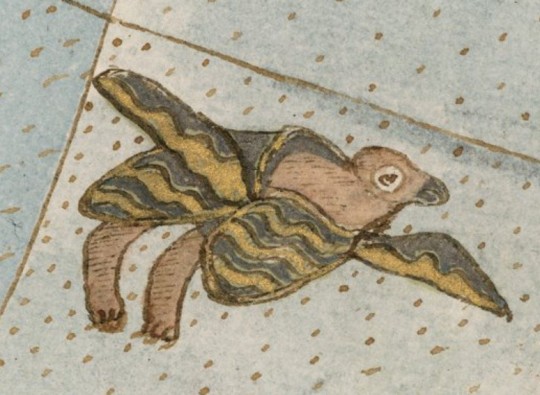
[Urbano Monte’s 60 sheet manuscript map of 1587, fully digitized and assembled into a planisphere @ the David Rumsey Map Collection]
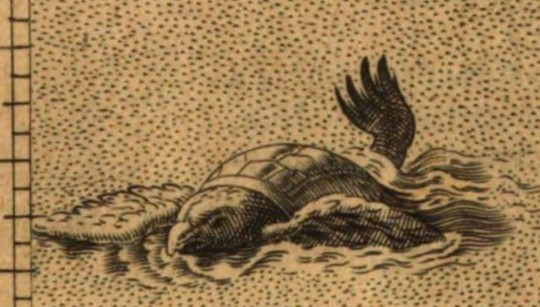
[Mercator, Tabulae geographicae Cl. Ptolemaei ad mentem auctoris restitutis ac emendatis.]
The Sea Pig of 1537
Blatant favouritism because this is both my icon and the only thing on this list I’ve written about semi-seriously, but it’s forbidden pet time!
In 1537 a pamphlet was printed in Rome briefly describing a monster found in the North Sea and much less briefly explaining how it was a sign of moral decline
Sample interpretations: extra eyes to signify lust & gluttony, a moon on the back of the head to signify turning away from truth, four dragon feet to signify malice from all four corners of the earth
*slaps the roof of sea pig* this bad boy can fit so many allegories for sin in it
Was this propaganda related to growing tensions between Catholics and Protestants? Probably! Was it also cutting edge marine biology? Yup, and it was a breakout hit, making its way into the works of Olaus Magnus, who calls it “ominous in every feature,” and Conrad Gesner, who reclassifies it as a kind of hyena

[The 1537 pamphlet, Monstrum in oceano Germanico a piscatoribus nuper captum & eius partium omnium subtilis ac theologica interpretatio, available in a bad scan from google books here]
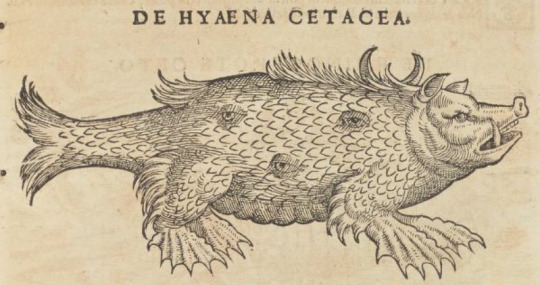
[Conrad Gesner, Historia animalium liber IV, digitally available @ the Biodiversity Heritage Library]
Honourable Mention: Whatever This Is
I genuinely don’t know
It shows up off the coast of Sardinia in the 1584 Mercator edition of Ptolemy's Geographia & the monsters in that are mostly derivative, but I can’t think of any source with this much hair, so here are some other possibilities:
Timetravelling wookie
Bigfoot’s No Good, Very Bad Beach Vacation
Lost dog


[ Mercator, Tabulae geographicae Cl. Ptolemaei ad mentem auctoris restitutis ac emendatis ]
Dishonourable Mention: This Guy
Only appears in two sources that I know of, for which I’m eternally grateful
Those sources are 16th c. world maps by Giacomo Gastaldi and Urbano Monte, men who owe everyone an apology for what they’ve unleashed upon the world
Here’s Chet Van Duzer’s translation of Monte’s description: “ …in the ocean here there often appear some fish in human form of such strangeness, that raising themselves above the water they surpass the highest masts of ships, so that, screaming horribly and making some valleys in the water, they move themselves with their arms which they have in the shape of great tree trunks twenty-five palms long, and there is no boatswain’s mate so brave that he would not be terrified by their monstrosity.”
Don’t care for that at all
Joking dislike aside, this resembles a water spirit of the kind more commonly found in bogs, fens, marshes, ponds or streams, and it upsets my sense of order to see it out of its natural habitat & in the open ocean
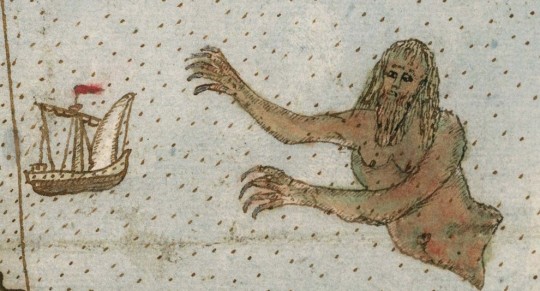
[Again, you can find Monte’s fully-assembled 60 sheet map at the David Rumsey Map Collection, and it truly is a work of art despite containing this man]
#asks#sea monsters#the return of medieval europe's best supporting act#worried men in boats#this one got away from me a bit#maybe the real monster is my inability to be brief about this interest
1K notes
·
View notes